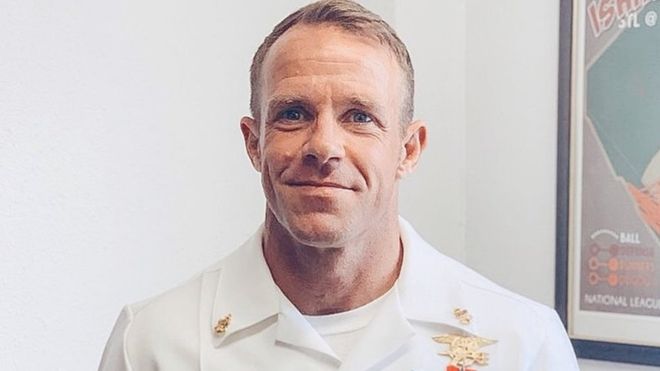
Edward Gallagher Credit: Facebook/FreeEddieGallagher
There’s been an enormous amount of debate about whether President Trump should have intervened in several military justice cases, offering pardons to convicted troops. In May, Trump pardoned Michael Behenna, a lieutenant convicted of murdering an Iraqi believed to be working with al Qaeda. A few weeks ago, the president restored Chief Petty Officer and Navy SEAL Edward Gallagher’s rank and allowed him to remain a member of SEAL community after he was convicted of posing with a corpse after being acquitted of murder charges and threatening fellow SEALs with death if they reported his actions. The president also pardoned Clint Lorance, a former Army lieutenant, who was serving a 19-year sentence for the murder of two civilians, and Maj. Mathew L. Golsteyn, an Army officer who faced murder charges for killing an Afghan he thought was a bomb maker. Charles Dunlap is one of the most experienced military lawyers around and now heads Duke University’s Center on Law, Ethics and National Security and I asked him if the president was right to pardon those men and whether it was likely to have any long-term impact on America’s relations with allies and enemies, as well as on the ranks of those who service. His answers? Read on! The Editor.
President Trump’s recent interventions in military justice cases has drawn howls of protest from some pundits who intone about irreparable harm to the military justice system, damage to relations with allies, and injury to civil-military relations. I personally disagree with most of Trump’s decisions but, from the perspective of someone who served more than three decades as a military lawyer, almost none of those effects are likely.
Why? First, none of the cases invovled servicemembers accused or convicted of “war crimes.” It is not unusual for military prosecutors to avoid charging people with war crimes these days because, if they do, they must prove the existence of a conflict lawfully characterized as a “war.” Avoiding war crimes also can help sidestep complications occasioned by the ‘combatant’s privilege.’ That legal privilege essentially relieves soldiers of criminal responsibility for killing the enemy in wartime under otherwise lawful circumstances.

Charles Dunlap
Such charging decisions matter. In Lt. Michael Behenna’s case the all-civilian Court of Appeals for the Armed Forces went out of its way to say that it was not adjudicating it in a law-of-war context and resolved it instead under “basic criminal law.” In applying that standard the civilian judges held in a narrow decision (a 3-2 vote) that because of his interrogation techniques, Behenna had no right to defend himself against the Iraqi who was purportedly reaching for Behenna’s weapon when he killed him.
This decision so alarmed some combat veterans that 37 generals and admirals, along with a former Inspector General of the Department of Defense, signed a brief supporting Behenna’s self-defense claim. When the U.S. Supreme Court declined to hear the case, Trump cited the self-defense issue in his decision to pardon Behenna.
It is also doubtful that even the International Criminal Court (ICC), which can prosecute war crimes, could have prosecuted any of the alleged killings as war crimes. It only extends jurisdiction to “willful killings” when “committed as part of a plan or policy or as part of a large-scale commission of such crimes.” There has been no evidence suggesting such was present in any of the recent cases.
Misunderstandings about the pardon power may also fuel speculation that its exercise is inherently damaging to the long-term interests of the military justice system. Actually, pardons and clemencies are not rogue, extra-legal actions, but rather are integral to the Constitution’s vision of criminal justice writ large. In Biddle v. Perovich, Oliver Wendell Holmes pointed out, for example, that a pardon “is a part of the constitutional scheme.”
There are different – yet reasonable – perspectives about the facts and the law in each of the cases, but that does not mean that the system has been damaged when a decision-maker embraces a position with which others disagree. After all, thousands of state and federal court decisions are reversed each year. But pardons or clemencies are not necessarily limited to situations where error has occurred. Instead, one of their purposes is “to temper justice with mercy in appropriate cases.” President Obama’s more than 2,000 pardons and clemencies reflected an interest in freeing drug offenders, few of whom ever served their country. Trump has shown more interest than Obama in cases involving those who not only served in the military, but those whom the nation sent into combat.
Even pardons unpopular when issued do not seem to have much in the way of long-term negative effects. For example, most Americans opposed President Jimmy Carter’s pardon of “hundreds of thousands of Vietnam draft evaders in 1977, but it does not seem to have any discernable effect on today’s draft registration which enjoys a 91% compliance rate.
What about the long-term impact on morale and discipline of the troops? Are troops now more disposed to commit crimes because the president pardoned them? I don’t believe that the theoretical availability of a pardon or commutation at some undetermined time in the future has anything to do with troop behavior in the near or long term. Actually, I never heard of anyone – military or civilian – contemplating committing a crime including the remote possibility of a pardon into any part of their calculation as to whether or not they’ll carry out their plan.
There is also no evidence that Obama’s clemecies in so many drug cases led anyone to think that they could expect such treatment themselves. In the military context, when Obama slashed Chelsea’s Manning’s sentence from the 35 years a court-martial imposed for the largest leak of classified material in U.S. history to just seven years, many people thought it was a terrible blow to the military justice system.
The late Sen. John McCain said that “President Obama’s commutation of Chelsea Manning’s sentence is a grave mistake that I fear will encourage further acts of espionage and undermine military discipline.” While the decision still rankles some veterans, the fact is that there was no upsurge of Espionage Act violations in the armed forces, or any data showing a significantly adverse effect on morale and discipline.
What about long term damage to relations with our allies? I doubt it. In the first place, I’d expect that few of our allies want scrutiny of their own handling of wartime misconduct. The UK and Australia, for example, are struggling with their own allegations of troop misconduct. In fact, the international community has nothing to brag about. In more than 17 years the ICC has just eight war-crime convictions for its efforts, despite spending well more than a billion dollars.
It is not clear that dispositions of military justice cases have the kind of long-term effect we would hope. For example, in the Abu Ghraib detainee abuse scandal, several soldiers were convicted and no clemency was granted. Yet Gen. David Petraeus said in 2010 that “Abu Ghraib and other situations like that are non-biodegradables. They don’t go away. The enemy continues to beat you with them like a stick.”
Robert Gates’ observations in the aftermath of the WikiLeaks disclosures also has relevance here. He said then that the characterizations of the impact of the releases on U.S. foreign policy “as a meltdown, as a game-changer, and so on” were “fairly significantly overwrought.”
He added:
The fact is, governments deal with the United States because it’s in their interest, not because they like us, not because they trust us, and not because they believe we can keep secrets. Many governments — some governments deal with us because they fear us, some because they respect us, most because they need us. We are still essentially, as has been said before, the indispensable nation.
Impact on civil-military relations? Again, there is no evidence that Obama’s release of Chelsea Manning compromised the military’s high standing in the public’s eyes, and there is no reason to think Trump’s actions will change that.
Although we may disagree with specific actions, I contend that, in a democracy, elected civilian leaders ought to exercise oversight over the activities of the armed forces, including the justice system that provides accountability for those forces. Among other things, when properly done civilian oversight can serve as a bulwark against unfairness in the ranks. It doesn’t hurt for military leaders to be reminded from time to time that their civilian boss is watching. So, no, I don’t think there will be long-term adverse effect on civil-military relations.
Yes, there is the complicating factor of Navy Secretary Richard Spencer was forced to resign by Defense Secretary Mark Esper. Spencer tried to cut a deal directly with the White House about the Gallagher case and didn’t tell his boss. Esper’s rationale for the firing was more an enumeration of widely-respected fundamentals of bureaucratic behavioral norms: you follow the chain of command, you keep your boss informed, you say publicly what had been agreed upon in private, or resign if you cannot agree.
Esper also said officials in government “are responsible for our organizations and whatever they say and do or don’t say and don’t do.” Although he tried to dress up his termination in noble terms, Spencer was already vulnerable because of serious allegations about the Navy’s mishandling of much of the Gallagher case during his watch. Indeed, a comprehensive review ordered by the Chief of Naval Operations has been underway since August. If there are any long-term effects from the Gallagher case, they will likely be positive for the Navy and the military justice system writ large.
People can – and should – debate the wisdom of Trump’s decisions, as they will certainly be fodder in the near-term political battles. Still, the long-term negative effects, if any, should be fairly modest. One caveat: if the president intervenes too often, the cumulative impact could be damaging.
France, Germany ink deal on way ahead for ‘completely new’ future European tank
Defense ministers from both countries hailed progress on industrial workshare for a project that they say “will be a real technological breakthrough in ground combat systems.”

























